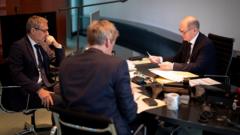Chancellor Olaf Scholz highlights Germany's commitment to supporting Ukraine following a significant phone conversation with President Putin, who downplays NATO’s role in the conflict.
Scholz Warns Putin: North Korean Troop Deployment Marks “Grave Escalation” in Ukraine Conflict

Scholz Warns Putin: North Korean Troop Deployment Marks “Grave Escalation” in Ukraine Conflict
German Chancellor calls for peace negotiations amidst rising tensions
In a notable shift in diplomatic communications, German Chancellor Olaf Scholz engaged in his first phone conversation with Russian President Vladimir Putin since December 2022. This call on Friday marked a critical moment as Scholz expressed his deep concern over Russia’s recent decision to deploy North Korean troops in Ukraine, labeling it a “grave escalation” of the ongoing conflict. Scholz urged Putin to conclude hostilities and withdraw Russian forces from Ukrainian territory.
The Kremlin characterized the dialogue as “a detailed and frank exchange of opinions regarding the situation in Ukraine” and suggested that the mere existence of this conversation is a step in the right direction. Ukrainian President Volodymyr Zelensky responded to the exchange by calling it a “Pandora’s box,” suggesting it could diminish the isolation Putin has faced from the international community.
During the hour-long phone call, Scholz condemned Russia’s military actions, particularly the air strikes targeted at civilian infrastructure, and reiterated Germany's steadfast resolve to aid Ukraine in its defense against Russian aggression as long as required. According to reports, there was a pre-emptive discussion between Scholz and Zelensky both before and after the call, considering the sensitivities tied to Germany's historical role in the region.
Putin, however, maintained that relations between Russia and Germany have suffered significant setbacks due to what he described as Berlin's "unfriendly course." He emphasized that any peace negotiations must account for the “new territorial realities”—in his view, the Ukrainian lands currently under Russian occupation since the conflict escalated in 2022.
Contrary to Scholz's push for amicable dialogue, the Kremlin reiterated its stance that the roots of the conflict lie in NATO’s eastward expansion. Putin criticized NATO's actions as the catalyst for the current crisis and suggested that peace could only be achieved by addressing these underlying issues.
Looking ahead, Scholz is anticipated to consult with other global leaders, including Chinese President Xi Jinping at the upcoming G20 summit, as he navigates the complexities of international diplomacy amid rising domestic pressures regarding the war in Ukraine. With German elections approaching in February, the chancellor’s political future may hinge on his administration's handling of the conflict and pursuit of peace initiatives.
For Germany, the economic and political ramifications of the Ukraine war continue to grow, making the call for actionable peace talks increasingly urgent as the nation grapples with various internal challenges.
The Kremlin characterized the dialogue as “a detailed and frank exchange of opinions regarding the situation in Ukraine” and suggested that the mere existence of this conversation is a step in the right direction. Ukrainian President Volodymyr Zelensky responded to the exchange by calling it a “Pandora’s box,” suggesting it could diminish the isolation Putin has faced from the international community.
During the hour-long phone call, Scholz condemned Russia’s military actions, particularly the air strikes targeted at civilian infrastructure, and reiterated Germany's steadfast resolve to aid Ukraine in its defense against Russian aggression as long as required. According to reports, there was a pre-emptive discussion between Scholz and Zelensky both before and after the call, considering the sensitivities tied to Germany's historical role in the region.
Putin, however, maintained that relations between Russia and Germany have suffered significant setbacks due to what he described as Berlin's "unfriendly course." He emphasized that any peace negotiations must account for the “new territorial realities”—in his view, the Ukrainian lands currently under Russian occupation since the conflict escalated in 2022.
Contrary to Scholz's push for amicable dialogue, the Kremlin reiterated its stance that the roots of the conflict lie in NATO’s eastward expansion. Putin criticized NATO's actions as the catalyst for the current crisis and suggested that peace could only be achieved by addressing these underlying issues.
Looking ahead, Scholz is anticipated to consult with other global leaders, including Chinese President Xi Jinping at the upcoming G20 summit, as he navigates the complexities of international diplomacy amid rising domestic pressures regarding the war in Ukraine. With German elections approaching in February, the chancellor’s political future may hinge on his administration's handling of the conflict and pursuit of peace initiatives.
For Germany, the economic and political ramifications of the Ukraine war continue to grow, making the call for actionable peace talks increasingly urgent as the nation grapples with various internal challenges.






















